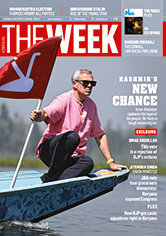The return of the National Conference to power in Jammu and Kashmir was somewhat expected, but what surprised me was the return of the BJP in Haryana (‘Hear the verdict’, October 20).
It won’t be an easy journey for Omar Abdullah and his team in J&K. They lack the power to bring about the changes they seek for the Union territory. Also, BJP leaders in the UT, along with the Jammu lobby, will do everything in their power to undermine the newly formed government, potentially forcing the Abdullahs to call for a fresh mandate. Who knows!
As for Haryana, it is likely that the BJP has learned its lessons and will move ahead with vigil. What’s notable is that the BJP now has strong backing from the RSS. So, don’t be surprised if a similar development unfolds in Maharashtra in November.
Devyani Bhatia,
On email.
I don’t think the mandate in Jammu and Kashmir has reflected the people’s desire to reverse the changes introduced by the Central government.
The fact is, Jammu and Kashmir has today become a highly polarised and divided region. Except for Ravinder Raina’s defeat in Nowshera, the BJP has performed well in the UT.
Mayank Gupta,
On email.
You have chosen to highlight the victory of the National Conference in Jammu and Kashmir. There have been significant developments in J&K since 2019, like increase in the number of professional colleges, and an overall improvement in education infrastructure. Along with so many mega infrastructure projects, there has been around 81 per cent decrease in terror incidents. Add to that, a 30 per cent increase in school attendance, and 9,000km of roads.
Yet, religion triumphed over development.
G.V. Prasad,
On email.
Omar Abdullah is capable of handling any situation with professionalism. The Kashmir valley remains strongly opposed to the BJP, and this sentiment is likely to persist. Without establishing a foothold in the valley, the BJP will struggle to gain a firm grip on the UT.
Swarup Mohin,
On email.
The Haryana elections delivered a surprising result. By addressing local concerns, rather than focusing solely on national issues, the BJP defied predictions, bringing significant changes to the state’s political landscape. The party’s promise of a corruption-free government, along with the Central government’s outreach efforts, helped maintain the appeal of brand Modi.
The Congress’s overemphasis on national issues—such as the caste census and economic inequality—failed to resonate with Haryana’s electorate, who were more concerned with local issues. National rhetoric and large-scale policy debates, while important, do not always translate into votes in state elections.
Sanjay Chopra,
On email.
Your interview with Jitendra Singh raises a crucial question. If both the ruling party and the opposition agree on restoring full statehood to Jammu and Kashmir, why is the process being delayed?
A senior BJP leader suggests that curbing separatist tendencies is one of the conditions for restoration. If that is the case, when will these tendencies be considered curbed enough to move forward?
D.K. Mishra,
On email.
The new norm
Udhayanidhi Stalin has the birth right to succeed his father as the next chief minister of Tamil Nadu, and be the leader of the family party when the time comes (‘Rising son’, October 20). This trend has become the norm, with sons, daughters, nieces, or nephews often chosen to inherit leadership roles from family rulers. While these people are elected following the usual display of democratic norms and fanfare, it is often with the backing of loyal followers of such leaders who enthusiastically hail the children.
Parthasarathy Mandadi,
On email.
Tharoor, you did it
Shashi Tharoor is arguably one of the most gifted writers and orators India has produced (‘Last word’, October 20). Many new words, phrases, and coinages can be attributed to him. I am sure even S. Jaishankar wouldn’t object if Tharoor claimed to have coined the term ‘multi-alignment’.
Tharoor need not be overly particular about such matters. His stature in the world of letters is widely acknowledged.
Tanushri Nagori,
On email.
President’s rule soon
Omar Abdullah is going to be the weakest chief minister Jammu and Kashmir has ever seen (‘People have favoured the NC-Congress alliance’, October 13). Abdullah is likely to face significant challenge in the days to come. The BJP leaders in Delhi and Jammu and Kashmir will make it difficult for him to succeed, potentially forcing him to step down.
As for Article 370, Abdullah is in no position to make any changes, even technically. It is likely that President’s Rule will return to Kashmir within two years.
Devender Tokas,
On email.
Simply hilarious
Anuja Chauhan’s column on toilet papers was hilarious (‘Toilet paper—a bum deal’, October 20). She has a remarkable way of addressing topics others would shy away from. Chauhan didn’t simply walk it; she skipped and danced across with ease.
Thomas Abraham,
On email.

